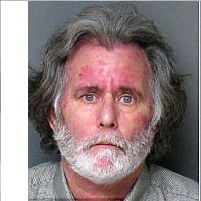Best Unusual Stories from AllGov—Financial Crisis Edition
Friday, January 06, 2012
 James Richard Verone (photo: Gaston County Jail)
James Richard Verone (photo: Gaston County Jail)
Desperate for care, James Richard Verone walked into his local RBC bank and demanded $1 from the teller. He then proceeded to wait for police to arrive and arrest him. Before doing so, he mailed a letter to the Gaston Gazette that stated, “I am of sound mind but not so much sound body.” Verone was hoping for a three-year sentence so that he can last until he qualifies for Social Security. But it appears that he aimed too low in committing his fail-proof crime. By demanding only $1, he was charged with larceny from a person, not bank robbery.
Sounding more like operators of retail businesses than scallywags of the high seas, pirates from Somalia have decided their inventory of hostages has grown too large, and are going to offer reduced ransom demands so they can increase turnover of ships they hijack. Simply put, they’re offering a sale. “We have lowered the ransom only for the ships we have used to hijack other ships,” pirate Hussein told Reuters.
The Jefferson County School District, west of Denver, will receive $90,000 over three years for running a two-inch ad in elementary students’ grade notices that promotes CollegeInvest, a state-run program that administers college savings programs. In fact, public school advertising is spreading. Since late 2009, Orange County, Florida, has been selling advertising at sports events and even on the school lunch menu.
Tight for cash, the state government has decided to sell the naming rights to its 42 rest stops and welcome centers to help cover the $20 million in annual operating and maintenance costs. The state will be limited in selling off naming opportunities, due to Federal Highway Administration rules that restrict commercial exploitation on federally-funded roads. But Virginia can make vending areas and flower beds available for corporate sponsorship, at an annual cost of at least $3.4 million.
Broke and in need of money, Harrisburg, the capital of Pennsylvania, has decided to auction off 8,000 artifacts, most of which hearken back to the Old West. The collection includes gloves that (maybe) belonged to Buffalo Bill; a Jesse James “dead or alive” wanted poster; gunfighter Doc Holliday’s dentist chair; a tomahawk that may have belonged to Crazy Horse; a horse’s hoof left over from the battle of the Little Big Horn; and a table Wyatt Earp once used to play poker. Also for sale is a more contemporary “vampire-killing kit” that comes with a pistol, stake, mirrors, crosses and a jar of garlic.
Here’s a problem most Americans probably weren’t worried about. In an effort to show the U.S. public they’re serious about getting tough on the rich, Republicans in Congress are proposing to end food stamps for millionaires. But the plan immediately raised the question: do millionaires really collect food stamps? The New York Times reported that “millionaires on food stamps are about as rare as petunias in January.”
On September 18, 1964, the Beatles landed unannounced at an old World War II air base outside the sleepy town of Walnut Ridge so that John, Paul, George and Ringo could make their way to a dude ranch in nearby Missouri. By the time the Beatles returned to the airport to fly out again, word had spread and hundreds of residents swarmed the tarmac to witness the most exciting thing ever to appear in their community of less than 5,000 people. Now, to commemorate that historic day, and make some tourist dollars, Walnut Ridge has unveiled a metal sculpture of the Beatles.
The Target retail chain has, for years, encouraged its workers in its 1,750 stores to refuse to join a union by using a 13-minute in-house video that, ironically, features actors who are union members. “If someone hires me to play a rapist, does it make me a rapist? You take the job, and you’re an actor,” Ric Reitz told Salon. “Am I pro-union? Absolutely.”
Despite the disaster at the Fukushima Daiichi nuclear plant in March that forced more than 100,000 people to flee their homes, the Japanese government is intent on exporting its nuclear technology to developing countries. Talks are continuing between Japan and Vietnam, which is considering a 1 trillion yen ($13 billion) project to develop two reactors. Japan is also vying to sell reactors in the United States, China, Turkey and Lithuania.
- Top Stories
- Unusual News
- Where is the Money Going?
- Controversies
- U.S. and the World
- Appointments and Resignations
- Latest News
- What If China Invaded the United States?
- Donald Trump Has a Mental Health Problem and It Has a Name
- Trump Goes on Renaming Frenzy
- Trump Deports JD Vance and His Wife
- Trump Offers to Return Alaska to Russia






Comments